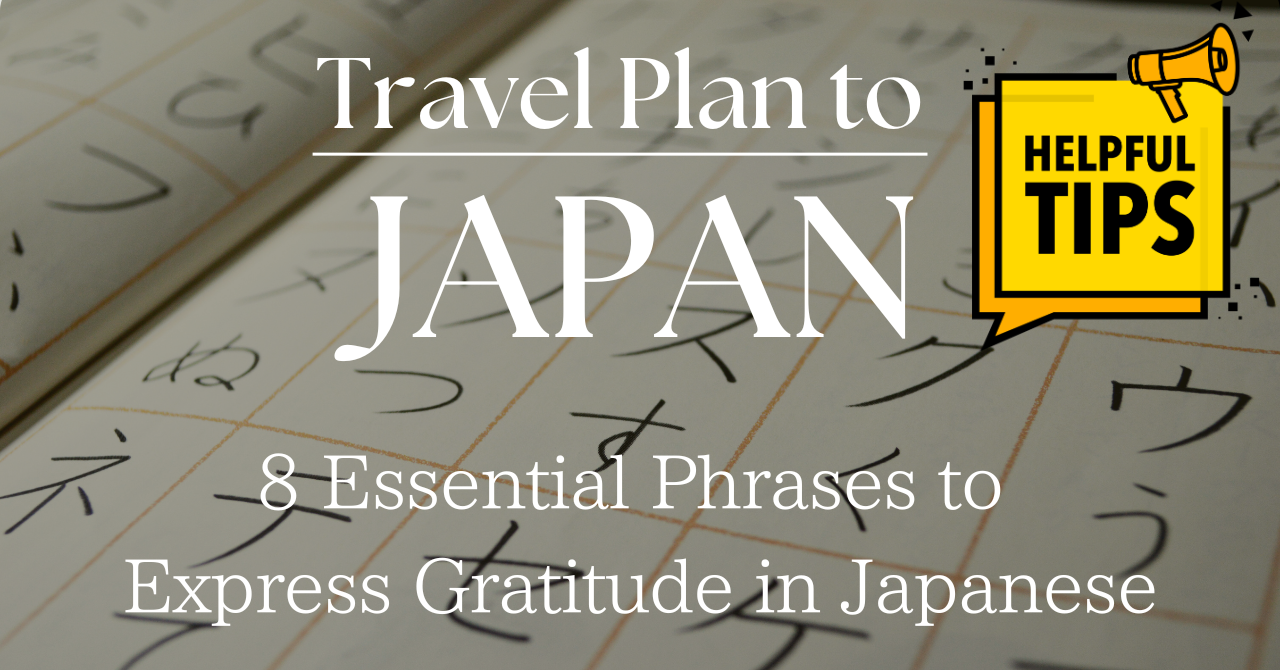8 Essential Phrases to Express Gratitude in Japanese

Thank you for considering a trip to Japan! In this article, we will introduce useful phrases to express gratitude in Japanese. By learning these phrases, your stay in Japan will be more enjoyable and your communication with locals will be smoother.


Learn Japanese and Express Your Gratitude!
Even if you don’t know other Japanese words, it’s great to be able to express gratitude in Japanese. In this article, we will introduce various expressions of gratitude. Using these expressions will make your trip to Japan even more wonderful.
1. ありがとうございます! (Arigatou gozaimasu!)
“Arigatou gozaimasu” is the most polite way to express gratitude. When you want to say thank you during your trip, this is the basic phrase you will use.
“Arigatou” is used among friends
While “arigatou” is also used to express gratitude, it is a casual phrase used with family, lovers, and friends of the same age or younger. When speaking to strangers, or even acquaintances who are older than you, especially teachers or superiors, always use “arigatou gozaimasu.” During your trip, most of the people you interact with will be strangers, such as shop clerks or hotel staff, so use the polite “arigatou gozaimasu.”
どうもありがとうございます (Doumo arigatou gozaimasu)
To make “arigatou gozaimasu” even more polite, you can say “doumo arigatou gozaimasu.” This phrase is used to express deeper gratitude.
本当にありがとうございます (Hontou ni arigatou gozaimasu)
When you want to emphasize your gratitude, use “hontou ni arigatou gozaimasu.” For a more casual expression, you can say “hontou ni arigatou.”
ありがとうございました (Arigatou gozaimashita)
After receiving assistance or help, especially at the end of the interaction, use “arigatou gozaimashita” to say thank you. For example, if someone helped you in a store or if you received help throughout the day, say “arigatou gozaimashita” when parting. Similarly, if you send an email to someone who helped you after returning to your home country, use “arigatou gozaimashita.” In casual situations, “arigatou” is also acceptable.
いろいろありがとうございました (Iroiro arigatou gozaimashita)
If someone has helped you with many things during your trip, say “iroiro arigatou gozaimashita.” “Iroiro” means “many things” or “everything.” In a casual setting, you can say “iroiro arigatou.”
2. すみません (Sumimasen)
すみません (Sumimasen – Polite)
“Sumimasen” is often learned as a phrase for apologizing, but it can also be used to express gratitude. Using “sumimasen” shows that you are sorry for the trouble or burden you caused the other person, thus emphasizing your gratitude.
ごめん (Gomen – Casual)
In casual situations, you can use “gomen,” especially with friends or family.
3. いえいえ (Ieie)
The most common response to “arigatou gozaimasu” is “ieie.” While you may have learned “dou itashimashite” as a response, it is rarely used nowadays. “Ieie” conveys a sense of “it’s okay” or “don’t worry about it.” When you say “arigatou gozaimasu,” it can be interesting to note how Japanese people respond to you.
4. Other Expressions of Gratitude
There are many other phrases to express gratitude, such as “osewa ni narimashita” (Thank you for taking care of me) or “kansha shiteimasu” (I appreciate it). Using these phrases can convey deeper gratitude.
5. Timing of Expressing Gratitude
Timing is also important when expressing gratitude. Say thank you after meals, after receiving service, or after being guided or helped. Expressing gratitude at the right moment will make it easier to show your respect and appreciation.
6. Emphasizing Gratitude
To further emphasize your gratitude, add a gesture such as a slight bow. In Japan, bowing is an important gesture to show gratitude and respect. Combining words with gestures can make your gratitude more sincere.
7. Practice Expressing Gratitude
Practice these expressions before your trip so that you can say them smoothly in Japan. Practice with friends or family to become more natural in expressing gratitude.
Review
- ありがとうございます! (Arigatou gozaimasu)
- どうもありがとうございます (Doumo arigatou gozaimasu)
- 本当にありがとうございます (Hontou ni arigatou gozaimasu)
- ありがとうございました (Arigatou gozaimashita)
- いろいろありがとうございました (Iroiro arigatou gozaimashita)
- すみません (Sumimasen)
- いえいえ (Ieie)
By learning these phrases, you can make your stay in Japan more enjoyable and heartwarming. Expressing gratitude in Japanese will enrich your interactions with local people.




